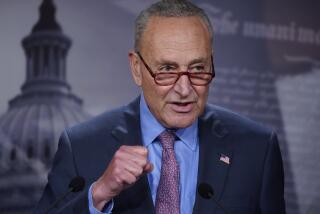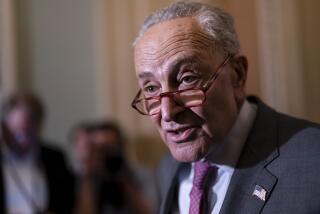Politics could delay a package to aid consumer
- Share via
WASHINGTON — Amid fresh signs that the nation is in recession -- and yet another jaw-dropping decline in the stock market -- Congress is gearing up to enact a new economic stimulus plan to help ordinary Americans.
But getting quick bipartisan agreement and White House support to help consumers is far from certain. The battle could be even tougher than the one that played out last month over the $700-billion rescue plan for the financial system.
Democrats and Republicans have starkly different views of what a stimulus package should contain, and President Bush has signaled his opposition to some of the key ideas being floated.
What could force compromise is the outpouring of evidence that the nation is headed for tough times even if the financial system should begin to stabilize.
The Dow Jones industrial average plummeted more than 700 points Wednesday after the government reported that retail sales sank 1.2% in September, the third straight monthly decline and the largest such pullback since 2005.
The unexpectedly steep drop was an ominous sign heading into the crucial holiday shopping season and comes as more Americans are losing their jobs.
“I believe the economy is now in a recession,” said Richard DeKaser, chief economist at banking firm National City Corp. in Cleveland. “What today’s retail sales report implies is that it will be steeper than many of us had feared.”
The grim retail sales report coincided with a warning from Federal Reserve Chairman Ben S. Bernanke, who told a group of economists in New York that the government’s plan to infuse $250 billion into the banking system wasn’t a cure-all.
“Stabilization of the financial markets is a critical first step, but even if they stabilize as we hope they will, broader economic recovery will not happen right away,” Bernanke said. He added that the Fed would continue to use all available tools to support the economy, leaving open the possibility of additional interest rate cuts.
Key members of both parties in Congress believe the government must find a way to put more money into the hands of average Americans, especially with consumer spending accounting for more than two-thirds of gross domestic product.
“Clearly, a significant initiative is required to promote job creation and economic growth,” House Speaker Nancy Pelosi (D-San Francisco) wrote to Democratic members this week.
“I agree wholeheartedly that Congress should take additional measures to get our economy back on track, and we should not wait until January,” said House Minority Leader John Boehner (R-Ohio).
The question is whether Congress can unite behind a stimulus plan before a new president takes office. If not, substantial pump-priming might not take effect until the spring or summer, a delay that could intensify the pain for many people.
Though it’s better late than never, the delay could hurt many struggling Americans, said Christian E. Weller, an associate public policy professor at the University of Massachusetts in Boston. “We’ve now, I think, avoided at least a major financial crisis, but we haven’t done enough on the economic side to avoid a major recession,” he said.
“In the end, there are hundreds of thousands of people who won’t be helped if it’s delayed for five or six months,” said Weller, who supports a broad stimulus package.
What makes quick agreement problematic is that the two parties have very different ideas about what a plan should contain.
Senate Majority Leader Harry Reid (D-Nev.) unveiled a $150-billion package that mirrors a stimulus proposal made by Democratic presidential nominee Sen. Barack Obama this week.
It includes spending on infrastructure projects, such as roads and school construction, extending unemployment benefits, providing energy assistance to low-income families and offering tax breaks to encourage businesses to hire more workers.
It would also require the federal government to be “more aggressive” in using its authority to push lenders to reduce foreclosures by renegotiating mortgage loans.
House Democrats have been discussing a similar package that would also help states with such costs as healthcare for the poor via Medicaid. Pelosi asked committee heads to hold hearings on such provisions and Bernanke is already scheduled to testify at one such event Monday.
Republicans, by contrast, favor tax cuts, including suspending the capital gains levy, lowering the corporate tax rate and providing federal guarantees on interbank lending. Among other things, they believe such measures would help create jobs.
“Our constituents are not looking at the mess in Washington or Wall Street and asking for the federal government to take care of other governments,” Boehner said.
“They are not asking for a one-term accounting fix to Medicaid, or pork-barrel spending masquerading as stimulus.”
For his part, Bush, speaking Wednesday at a deli in the hard-hit state of Michigan, argued that the government’s plan to inject billions of dollars directly into banks and buy “toxic” mortgage-backed securities would help workers and businesses.
“I was worried that if we did not do something about the financial situation, the economics would affect a lot of hardworking people all throughout our country, including right here in western Michigan,” Bush said in Ada, outside Grand Rapids.
White House spokeswoman Dana Perino said that Bush would consider economic stimulus proposals but has objections to some components advocated by Democrats, such as extending unemployment benefits and funding infrastructure projects.
Sen. Judd Gregg of New Hampshire, the top Republican on the Budget Committee and the Senate GOP’s lead negotiator on the bailout, said he would resist another stimulus package.
“I would hope that common sense would prevail and that we wouldn’t simply do another package that is going to dramatically aggravate what is going to be our really next major fiscal crisis, which is the size of this deficit we’re headed toward,” he said.
The parties could come together, as they did earlier in the year, in passing a stimulus package that included tax rebates. And their effort could be aided by taking up a bill after the election, in a less partisan atmosphere.
Outside groups are stepping up their efforts to pressure lawmakers to act.
Stephen E. Sandherr, chief executive of the Associated General Contractors of America, wrote to Pelosi this week touting the role construction projects can play in stimulating the economy and arguing that more than 3,000 highway projects could start in 30 to 90 days if Congress appropriated the $18 billion needed to fund them.
Tracy Mullin, president of the National Retail Federation, wrote to congressional leaders Wednesday calling for them to return to Washington after the election to put money in the hands of consumers.
“Consumer confidence has been badly eroded by the foundering economy and instability of the financial markets,” Mullin said.
But fear of economic turmoil could limit the effect of sending tax rebate checks directly to consumers, said Gary Schlossberg, senior economist at Wells Capital Management in San Francisco.
“Even if you get the tax rebate, you still have to make the decision of whether you save it or spend it, and I think the portion that saves will be larger if you still have the cloud of the financial markets hanging over us,” he said.
Schlossberg favors tax cuts instead of rebate checks, which he said only temporarily boosted consumer spending in the spring, after the government mailed them out as part of a $168-billion stimulus package.
But Douglas W. Elmendorf, a senior fellow at the Brookings Institution and a former economist for the Federal Reserve and Treasury Department, said temporary stimulus still helps the economy.
He opposes tax cuts as too slow to lead to a burst of new spending and said infrastructure projects also will not work fast enough.
But giving money directly to states such as California, which must slash spending in a downturn because they are forced to balance their budgets, “would be a very powerful boost to the economy.”
Elmendorf said Congress and the Bush administration were right to focus on Wall Street first but now must turn their attention to average Americans.
“I think it was appropriate to deal with financial issues first because the financial system was becoming unglued on a daily basis. And you can’t do everything at once,” he said. “But I think fiscal stimulus should be a very high priority at this point.”
--
richard.simon@latimes.com
Times staff writer Maura Reynolds contributed to this report.
More to Read
Inside the business of entertainment
The Wide Shot brings you news, analysis and insights on everything from streaming wars to production — and what it all means for the future.
You may occasionally receive promotional content from the Los Angeles Times.












